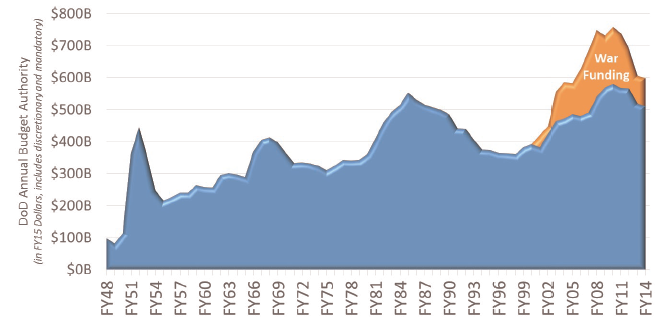
If the Pentagon needs more money—and that’s debatable—the Republicans have chosen the worst possible way to do it in the budgetary roadmaps both the House and Senate have recently approved.
That’s because they’ve kept in place the budget caps in place for defense and domestic discretionary spending for the proposed 2016 budget. While that keeps domestic spending in check, they’ve opted to fatten up the Pentagon’s war-fighting account by about $90 billion, which isn’t subject to the budget limits. Even President Obama, under heavy pressure from the Joint Chiefs, has blinked and said military spending should be boosted above the caps set in 2011. But he wants domestic spending increased as well.
The idea of special war-fighting budgetary add-ons makes sense, because while the Pentagon’s base budget trains and outfits the U.S. military, it doesn’t pay for it to wage war. But such Overseas Contingency Operations accounts are supposed to go away when the wars end, as they have in Afghanistan and Iraq (the current U.S.-led small-scale air war against the Islamic State of Iraq and Greater Syria, like the 2011 air war over Libya, can be funded out of the base budget). But the Republicans have basically perverted a responsible approach to funding the nation’s wars into an annual, multi-billion-dollar slush fund subject to even less congressional scrutiny than regular military budgets get.

“There’re a lot of different opinions about whether there should be an overseas contingency account or not, and whether it’s a slush fund or not,” then-defense secretary Chuck Hagel said last September.
The account, whatever it’s called, has become a rhetorical device: pump it up, defense hawks say, or risk crippling national security. Of course, that’s flat-out wrong. If the nation believes it needs to spend more on the military, it should hold an honest debate on the topic and then vote accordingly, without budgetary chicanery.
Hagel’s successor, Defense Secretary Ash Carter, is warning that the military needs more money beyond the $499 billion permitted by the 2011 law. But he says that force-feeding the Pentagon like a foie gras goose doesn’t solve the problem. “Current proposals to shoe-horn DOD’s base-budget funds into our contingency accounts would fail to solve the problem,” he said Thursday, “while also undermining basic principles of accountability and responsible long-term planning.”
So as the defense-budget debate continues, here are some facts to keep in mind:
1. With the Pentagon’s base-budget caps in place, its funding would rise slightly in coming years. Accounting for inflation basically makes for flat spending through 2024. The U.S. military budget today, under those caps, is higher than the Cold War average. That’s because even as the U.S. military shrinks, the cost of each remaining weapon bought and troop recruited has soared.
2. The reason the Pentagon is having trouble living within those levels is that it has grown used to pilfering its war-fighting accounts to fund normal operations, including purchasing weapons. A recent congressional report said that the Pentagon spent $71 billion of its war accounts on non-war spending from 2001 to 2014.
3. The war-fighting accounts have accounted for 23% of Pentagon spending over the past decade. Like a functioning alcoholic, the U.S. military has gotten used to the constant buzz, and is petrified of being forced to put the bottle away.
But here’s why it should stop cold turkey and get back to basic budgets:
1. Without standard congressional scrutiny, the money will be spent with even less oversight than normal Pentagon spending.
2. Because it is an annual appropriation that has to be renewed each year, there is no way the Pentagon can wisely budget for it in advance, and spent it smartly when and if it gets it.
3. Finally, counting on such a loophole sends the wrong signal. Troops are being paid and weapons bought, in part, with the equivalent of payday loans.
It also leads allies to question U.S. commitments. “We’re putting things in the Overseas Contingency Operations fund like the European Reassurance Initiative,” says Todd Harrison, a defense-budget expert at the nonprofit Center for Strategic and Budgetary Assessments think tank. “If we’re really trying to reassure our European allies in the face of a more-assertive Russia that we’re going to be there for them, why are we putting that into an account that’s only one year at a time?”
More Must-Reads from TIME
- Donald Trump Is TIME's 2024 Person of the Year
- TIME’s Top 10 Photos of 2024
- Why Gen Z Is Drinking Less
- The Best Movies About Cooking
- Why Is Anxiety Worse at Night?
- A Head-to-Toe Guide to Treating Dry Skin
- Why Street Cats Are Taking Over Urban Neighborhoods
- Column: Jimmy Carter’s Global Legacy Was Moral Clarity
Contact us at letters@time.com